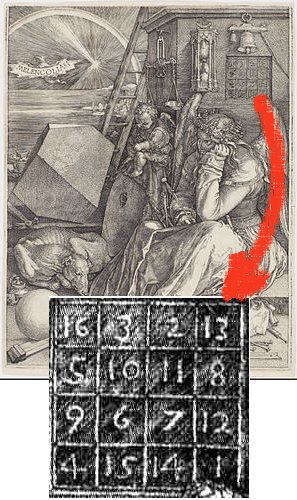
 |
Magic SquareArrange the given numbers in a three by three grid to make a magic square. |
Drag the numbers into the green cells to make a magic square.
The totals of each row, column and diagonal should be the same.
Congratulations!
Claim your trophy by clicking on the red button below.
Are there any other ways to make a magic square using these numbers?
Your answer is not correct.
The totals of each row, column and diagonal should be the same. Try again.
1
2
3
4
5
6
7
8
9
This is Magic Square level 1. You can also try:
Level 2
Level 3
Level 4
Level 5
Level 6
Level 7
Level 8
|
|
||
Transum.orgThis web site contains over a thousand free mathematical activities for teachers and pupils. Click here to go to the main page which links to all of the resources available. Please contact me if you have any suggestions or questions.
|
More Activities: |
|
|
Mathematicians are not the people who find Maths easy; they are the people who enjoy how mystifying, puzzling and hard it is. Are you a mathematician? Comment recorded on the 8 May 'Starter of the Day' page by Mr Smith, West Sussex, UK: "I am an NQT and have only just discovered this website. I nearly wet my pants with joy. Comment recorded on the 19 November 'Starter of the Day' page by Lesley Sewell, Ysgol Aberconwy, Wales: "A Maths colleague introduced me to your web site and I love to use it. The questions are so varied I can use them with all of my classes, I even let year 13 have a go at some of them. I like being able to access Starters for the whole month so I can use favourites with classes I see at different times of the week. Thanks." |
Each month a newsletter is published containing details of the new additions to the Transum website and a new puzzle of the month. The newsletter is then duplicated as a podcast which is available on the major delivery networks. You can listen to the podcast while you are commuting, exercising or relaxing. Transum breaking news is available on Twitter @Transum and if that's not enough there is also a Transum Facebook page. |
|
Numeracy"Numeracy is a proficiency which is developed mainly in Mathematics but also in other subjects. It is more than an ability to do basic arithmetic. It involves developing confidence and competence with numbers and measures. It requires understanding of the number system, a repertoire of mathematical techniques, and an inclination and ability to solve quantitative or spatial problems in a range of contexts. Numeracy also demands understanding of the ways in which data are gathered by counting and measuring, and presented in graphs, diagrams, charts and tables." Secondary National Strategy, Mathematics at key stage 3 |
||
Go MathsLearning and understanding Mathematics, at every level, requires learner engagement. Mathematics is not a spectator sport. Sometimes traditional teaching fails to actively involve students. One way to address the problem is through the use of interactive activities and this web site provides many of those. The Go Maths main page links to more activities designed for students in upper Secondary/High school. | ||
Teachers | ||
|
If you found this activity useful don't forget to record it in your scheme of work or learning management system. The short URL, ready to be copied and pasted, is as follows: |
Alternatively, if you use Google Classroom, all you have to do is click on the green icon below in order to add this activity to one of your classes. |
It may be worth remembering that if Transum.org should go offline for whatever reason, there are mirror site at Transum.info that contains most of the resources that are available here on Transum.org. When planning to use technology in your lesson always have a plan B! |
|
|
||
Transum,
Monday, December 2, 2013
"As an extension activity consider the following questions:
How many magic squares are there that contain the numbers 5, 8 and 12? (ignore rotations and reflections).
Is the centre number of a magic square always one third of the row and column totals?
Can you create a magic square using only prime numbers?"
Transum,
Friday, June 2, 2017
"In the year 1514 the German artist Albrecht Dürer created an engraving called Melencolia with a magic square in the background. The image below shows an enlargement of the magic square. The date appears in the bottom row of the magic square.
 "
"
Ian Stewart, Cabinet Of Mathematical Curiosities
Friday, June 2, 2017
"Using consecutive whole numbers and counting rotations and reflections of a given square as being the same there are precisely:
1 magic square of size 3 × 3
880 magic squares of size 4× 4
275,305,224 5×5 magic squares of size 5 × 5.
For the 6×6 case, there are estimated to be approximately 1.77 × 1019 squares."
Transum,
Saturday, February 17, 2018
"One method of finding a solution to a puzzle in which the digits one to nine have to be arranged in a particular formation is by trying every different permutation. This strategy however is very time consuming. Even if it only took one second to arrange the numbers and check whether a solution has been found, you would need to allow over one hundred hours to complete the task!
Developing a strategy with some insight or consideration of the number patterns might be a better course of action. Good Luck! "
Student,
Tuesday, April 2, 2019
"There is a pattern that isn't time consuming. Place the 1st number in the center of the top row(can be done on the sides but easier if explained like this)(can only be done on oddxodd magic squares) and place next number on the box diagonally upwards to the right(could be left as well). If there is no box on top, place the number at the bottom of the next column. If there is no box to the right, then place it at the start of the next row. If the space is blocked by a number, then place it underneath the number you just wrote. When you reach the upper-right corner, place the next number directly below it and continue on. Repeat until all boxes are filled"
Bernie Westacott, Twitter
Friday, April 30, 2021
Juan, España
Thursday, March 9, 2023
"Con estos números 7,37,43,67,73,79,103,109,139, se puede formar un cuadrado mágico de 3x3 como indica sus ejemplos?
[Translation: With these numbers 7,37,43,67,73,79,103,109,139, can a 3x3 magic square be formed as indicated by your examples?]"